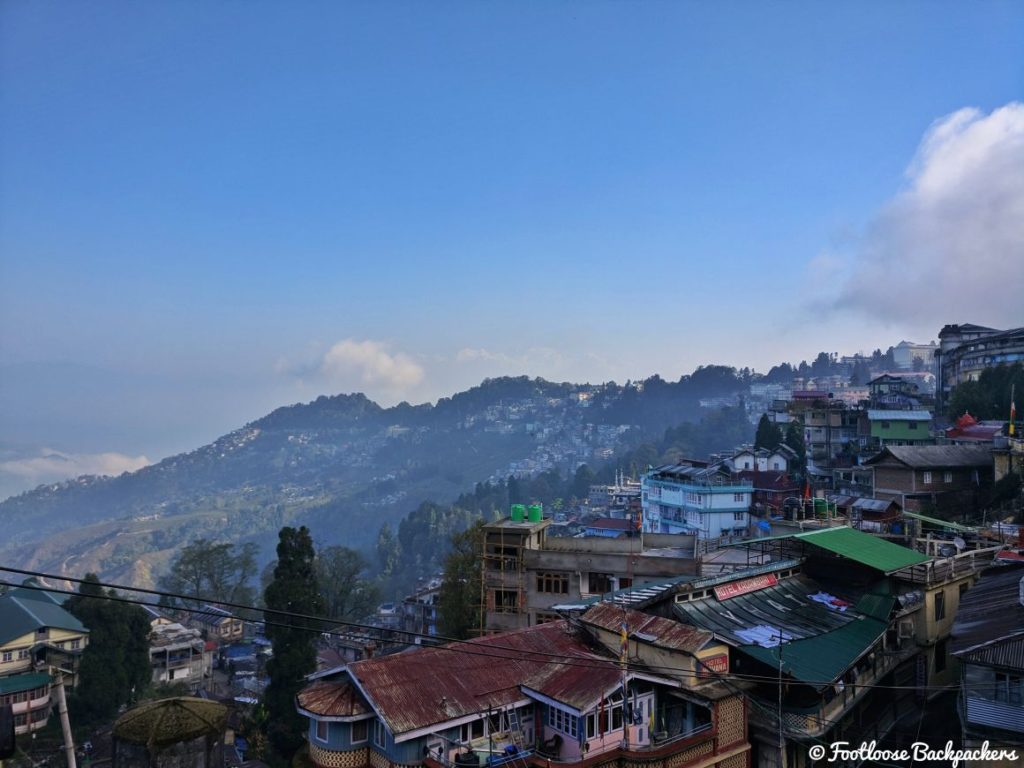Located at a height of 2185 metres above the sea level, Darjeeling, also known as the ‘Queen of Hills’ is a quaint little hill station that consists of Mt. Kanchenjunga’s summit as the backdrop. Established in the mid-19th century, this town offers palatial greenery and a champagne of tea estates. The sumptuous aroma all around and the sound of chanting of the Buddhist mantra give you the much-required peace of mind. We were often told that Darjeeling has been commercialized to such an extent that it has lost its charm. But we would definitely argue the toss, for Darjeeling possesses such opulent landscapes that are a treat for sore eyes.

How to reach
Rail: The nearest Railway Station is that of New Jalpaiguri, which 62 km away from the main city.
Air: The nearest airport is Bagdogra Airport. Delhi, Kolkata and Guwahati have direct flights to Darjeeling. Since we were travelling from Bangalore, we had to opt for a connecting flight (layover being in Kolkata).
Climate and Acclimatization
Situated at approximately 7000 ft, Darjeeling has a comfortable climate and you need not stay indoors for acclimatization. When we went (April mid), the temperature ranged between 12 to 15 degrees. Pleasant, isn’t it?
Itinerary
We stayed in Darjeeling for one night and explored some of the most commonly known, rather famous, tourist places the next day. A summary of the route map of our Sikkim Trip is given below:
Accommodation in Darjeeling:
Revolver Inn: Snug rooms in a quiet surrounding, Revolver Inn was one of our best bets. Hardcore Beatles’ fans, the hosts have adorned the place with catchy little memories of the band. The rooms in the building have names too. Any guesses what? Yes, they are named Paul, John, George and Ringo. The rates are economical; the rooms are clean, small but cosy. The special feature is the heating provision in the mattress. The food that the hosts provide in their small restaurant is delicious.
A day in and around the town
1. Buddhist Temple and Peace Pagoda
The Peace Pagoda is hardly 3 km away from the mall road. In addition, the Buddhist temple is situated in the same campus. The Japanese Peace Pagoda is one of the several pagodas built by the Buddhist Nipponzan Myohoji. The aim of building this sacred testament was to encourage harmony, unity and goodwill amongst the people belonging to different sections of the society. The drumming Prayer sessions are held in the Buddhist temple and the devotees are offered a hand drum and encouraged to join in the rituals. The Buddhist mantra- Nam-Myoho-Renge-Kyo– is chanted while the drum is played in sync. The vital part of Buddhism is the belief that we have the ability to overcome any problem in life. We have the ability to transform any suffering. This mantra is a promise to oneself to never succumb to difficulties and to win over any form of suffering. The entry is free.
Japanese Peace Pagoda
2. Dali Monastery
One of the largest monasteries built in pure Tibetan style, Dali Monastery, is exquisite. Perched on a steep hill, the actual name of this monastery is Druk Sangag Choling Monastery. As you make your way through the arch gate, a series of waving flags greets you. A few steps lead you to a major prayer room that houses large prayer wheels. A little further is a huge prayer room with Buddha statues and superfluous wall art. The majestic grandeur and simplicity of the architecture is praiseworthy. The entry is free.
The colourful and vibrant Dali Monastery
3. Batasia Loop
Batasia Loop can be visited as a part of the Toy Train Journey but in case you miss the train, do visit this war memorial that was built in order to commemorate the Gorkha Soldiers who sacrificed their lives in various wars after India’s independence. The entry ticket is priced at 30 INR/person.
4. Ghoom Monastery
Ghoom Monastery is another remarkable monastery that is on everyone’s must-visit list. Unfortunately, our Toy Train (morning 07:30 Hrs) was cancelled and hence that poured water on our plan to visit this place. The Toy Train has a stopover at this Monastery. Due to lack of sufficient time, we decided to skip this and instead explored the Lamahatia Village Eco-park.
5. Lamahatia Village Eco Park
Located 23 km away from Darjeeling and on the way to Pelling, this eco-park has an entry ticket priced at 10 INR/ person. A cemented gazebo leads to the top where you can see a row of colourful prayer flags waving. We were told by the locals that as the wind passes through the flags, it purifies the surroundings and also the minds of the people. A tiny wooden watch tower is nestled between the huge trees. A path through the forest leads to a water body. Since the walk was long, we skipped that. But if you have the stamina and the will, you must try it out.
Lamahatia Eco-park with the wooden watch tower in the view
6. Tiger Hill
Tiger Hill is said to offer the best sunrise views of Mt. Kanchenjunga. We were all prepped up for our sunrise but the fog and clouds spoilt our plan. Our driver suggested that we skip going to Tiger Hill, for nothing would be visible. We are happy that we listened to him. It saved us a lot of time.
Post lunch (at around 14:00 hrs), we started for Pelling.
(Hyperlinks will be available soon)
To know the details of our entire trip, click Sikkim Itinerary.
For further information, click the links below:
Things to do in Pelling
Demanding Yet Beautiful North Sikkim
Enchanting East Sikkim
Gangtok at a glance